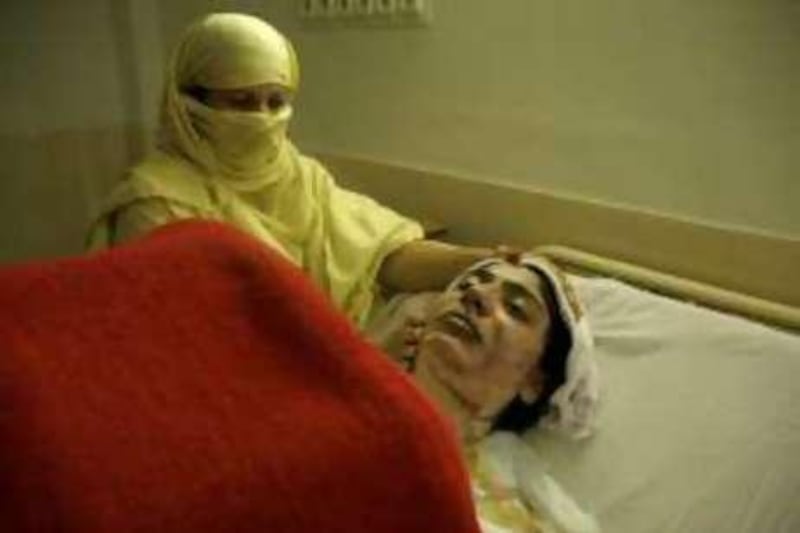LAHORE // A 32-year-old Pakistani woman is battling for her life after suffering extensive burns in an attack by her three sisters-in-law at their home in the central city of Jhang. Riffat Nadeem, a mother of two from Rawalpindi, was saved by neighbours. She remains lucid but is struggling to survive at Lahore's Mayo Hospital where, after media intervention, she is being treated free of cost on the orders of Salman Taseer, the governor of Punjab province. Lying in her bed in the intensive care unit, she braves intense pain and the humiliation of being barely covered in the presence of a male stranger to relate her story, one that is atypical in that it has been politicised by media coverage but commonplace in that she still faces an uphill battle for justice.
It was 4.30pm on Nov 6; Riffat was working in the kitchen with her sisters-in-law. When she turned to go outside to gather some tea leaves, the eldest, Aziz Fatima, threw an unidentified flammable liquid on her from behind, setting her clothes alight. Instinctively, Riffat ran across the courtyard to get out of the house and find help, pushing aside the youngest sister-in-law, Habib Fatima, who she says tried to block her escape. Still aflame, she ran across the mud street into a neighbour's courtyard, where the lady of the house and a male passer-by smothered her in a palm-leaf mat. Riffat recalled how her three sisters-in-law ran in, wailing melodramatically at her, trying to paint the attack as a suicide attempt.
"When I saw their act I wanted more even than an end to the burning pain, for God's wrath to descend upon them," she said. The three women dropped the act as soon as the neighbours called the police and Riffat's family in Rawalpindi. However, joined by relatives from the vicinity, the women blocked the door of the neighbour's house and warned the rescuers not to interfere with "family honour" - a serious threat in a society plagued with 636 so-called honour killings in 2007.
It was then that her husband's nephew, Omar Haider, 18, arrived with a mobile phone with husband Mohammed Nadeem Faiz Siyal on the line from the western Saudi city of Madinah, where he runs a gypsum business with his two brothers. "He was furious with me for involving strangers and ordered me to return home," Riffat said. She said the attack was the culmination of a spiral of domestic violence over four years, in which she suffered frequent beatings from her husband's siblings - two of which, in 2004 and 2006, resulted in miscarried pregnancies.
Riffat's story is representative of widespread domestic violence involving husbands and their female relatives. Motives range from petty jealousies to greed; another is the desire to remarry - as is allegedly the case with Riffat's husband. She was able to escape only under police escort to the Jhang district hospital, where a physician diagnosed her as suffering first, second and third degree burns to 60 per cent of her body; particularly dangerous are burns to the right breast, which partially melted and stuck to her rib cage. Doctors in Lahore said it would be four to five weeks before they knew if Riffat would survive; on average, three in 10 patients with such extensive burning die. While Riffat was receiving first aid, her husband called again to speak to his elder child, five-year-old daughter Afshia. "I kept telling Papa, 'Auntie burnt Mama, auntie burnt Mama', but he got very angry and told me to stop talking against auntie," Afshia said in an interview with The National from her grandparents' home in Rawalpindi. Riffat's attackers were allowed to flee by the police, enabling them to secure pre-arrest bail. That has earned the local police chief a warning from the governor, but other recent public interventions by top government officials - as in the case of a reported burial alive in July of five women in Balochistan province and the October murder of a pregnant teenager in Sindh - are yet to lead to arrests of politically connected suspects. Israrullah Zehri, a senator who in August publicly condoned the Balochistan case as a legitimate case of tribal justice, was recently appointed a minister in the federal cabinet. thussain@thenational.ae





